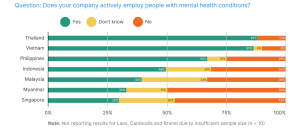A new region-wide report has found that nearly half (45%) of Singaporean employers are hesitant to ‘actively employ’ individuals with mental health conditions, while 26% are unsure whether their companies ‘actively employ’ such individuals, higher than the regional average. In contrast, smaller Southeast Asian markets, including Vietnam (86%), Thailand (87%) and the Philippines (65%) lead the region in actively hiring individuals with mental health conditions.
The ASEAN Workplace Wellbeing 2024 Report was conducted by leading regional mental health care company Intellect, and surveyed 585 HR professionals across Southeast Asia in 2024. The report aims to understand current workplace wellbeing practices, awareness, resource accessibility, and stakeholder opinions within the private sector across ASEAN.
This research study found that while many organisations have implemented mental health literacy and awareness programmes, gaps remain – particularly in hiring individuals with mental health conditions. The report also highlights the need for comprehensive training, accessible resources, and stronger organisational support to address these challenges.
Positive shift across ASEAN Organisations in prioritising change management practices over simply providing wellbeing services and support
There has been a positive focus in how ASEAN organisations improve mental health and wellbeing management, beyond simply providing services and support. Human Resource (HR) professionals are reportedly prioritising communication on mental health and neurodiversity inclusion (56%) and training managers on mental health literacy (56%), reflecting a shift towards change management practices and evolving wellbeing programs to address emerging challenges. [Refer to Appendix A for more details]
Persistent gaps in inclusive hiring despite rollout of mental health initiatives and leadership training across organisations
According to the report, the majority of organisations (65%) across the region have introduced mental health literacy and awareness training for employees, while three in five (60%) have implemented wellbeing policies and practices aimed at improving employee welfare. While these numbers suggest progress, the scope of mental health resources and their impact varies significantly across countries. [Refer to Appendix B for more details.]
Organisations in Singapore claim to have the highest rate of inclusive hiring policies (89%) and workplace/physical environment adjustments (78%) compared to the regional average (60% and 68% respectively), but nearly half of employers (45%) hesitate to hire individuals facing mental health challenges. This disconnect underscores a critical gap between policy implementation and practical outcomes in fostering truly inclusive workplaces.

In Singapore, employers are guided by the Tripartite Guidelines on Fair Employment Practices (TGFEP), which discourages asking job applicants to disclose personal information – including mental health conditions – unless it directly relates to the job. This may account for some of the data as to why many Singaporean employers don’t ‘actively hire’ those struggling with mental health conditions, which noted that non-disclosure practices are the main reasons (67%) that they do not actively hire these individuals. However, the survey also found key obstacles in hiring individuals with mental health conditions in Singapore included limited mental health awareness (24%), negative employee attitudes (10%), and management’s reluctance to accommodate flexible working conditions (5%).
Theodoric Chew, Co-founder & CEO of Intellect said, “While Singapore rightfully restricts employers from asking specific questions around the mental health of candidates, our findings indicate there remains a significant gap in both awareness and willingness to accommodate employees with mental health challenges. Workplaces play a very important role in dismantling the stigma surrounding mental health – and given that 17% of Singaporeans suffer from poor mental health, it’s imperative that hirers and leaders understand the need to integrate mental health support across the business.”
“In fact, the ongoing development of the Guidelines on Providing Support for Employees with and at-risk of Mental Health Conditions by Workplace Safety and Health (WSH) Council, calling for stronger return-to-office support for employees with mental conditions, is a step in the right direction. Ultimately, by providing proper training, flexible work policies, and easily accessible mental health resources, employers can shift this conversation away from being something that is taboo, thus improving both hiring practices and workplace wellbeing,” he added.
The lack of robust mental health support in ASEAN, and the resulting low levels of employee engagement
Across Southeast Asia, organisations reported having access to various mental health resources through their Employee Assistance Programmes (EAP). These include mental health personnel like coaches or counsellors (63%), digital mental health support (50%), helplines (38%), and crisis support (34%). While organisations in Thailand lead Southeast Asia in offering more comprehensive mental health programmes to employees (23%), there remains significant room for improvement throughout the region.
In Singapore, less than one in five (15%) of HR professionals report that their companies offer comprehensive mental health resources [Refer to Appendix C for more details]. The challenge is further compounded by alarmingly low employee engagement with available mental health services. While more than nine in 10 (93%) Singaporean companies communicate mental health programmes to their staff, less than one in 10 (5%) employees actively engage with these services—a rate far below the regional average of 47%. [Refer to Appendix D for more details.]
By comparison, Vietnam (85%), Thailand (63%), and the Philippines (49%) see significantly higher participation, highlighting the stark contrast in workplace mental health engagement across Southeast Asia.
How companies can overcome the challenges in championing organisational-wide support for mental health initiatives across ASEAN
The report also reveals significant challenges in the implementation of effective mental health policies across ASEAN countries. While the majority of organisations have made strides to improve mental health literacy (65%) and have introduced wellbeing policies (60%), in Singapore, less than one in four (24%) organisations provide proactive day-to-day mental health support.
To enhance inclusive hiring and supportive practices in the workplace, it is critical that leaders, HR professionals, and employees are empowered to support organisational-wide efforts. According to the World Health Organisation, organisations should provide training for recruiters and hiring managers on how to effectively assess and accommodate candidates with diverse needs. HR professionals must ensure that mental health resources are not only readily available, but also accessible and tailored to meet employees’ needs. Additionally, corporate symmetrical communication—where organisations listen and respond to employee concerns—can significantly improve engagement with mental health resources and drive overall effectiveness.
Theodoric Chew, Co-founder & CEO of Intellect said, “As Singapore shifts the responsibility of mental health care from hospitals to the community to widen the number of touch points for those in need, workplaces play a critical role in providing essential mental health support. To foster truly supportive environments, leaders and HR professionals need to go beyond offering resources, they must champion organisation-wide efforts in a way that meets the needs of the organisation and its employees.”
“Training programmes like Mental Health First Aid™ can empower managers and employees to handle conversations about mental health more sensitively, promoting the hiring of individuals with mental health conditions. With this report, employers and human resources professionals now have access to a wealth of employee data insights across the region, to make strategic and data-driven recommendations for overall organisational success,” he added.
To learn more about this research or to download the full report, visit here.
Explore HRTech News for the latest Tech Trends in Human Resources Technology.













